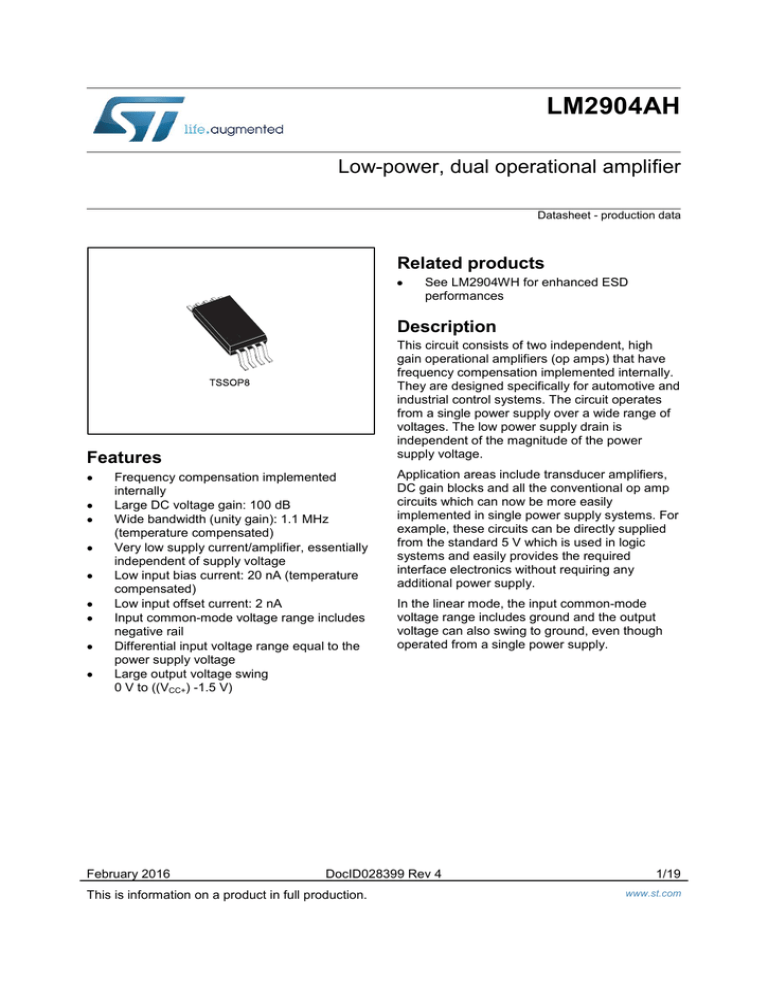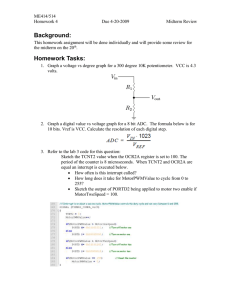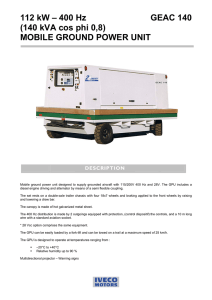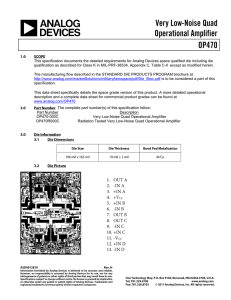
LM2904AH
Low-power, dual operational amplifier
Datasheet - production data
Related products
See LM2904WH for enhanced ESD
performances
Description
This circuit consists of two independent, high
gain operational amplifiers (op amps) that have
frequency compensation implemented internally.
They are designed specifically for automotive and
industrial control systems. The circuit operates
from a single power supply over a wide range of
voltages. The low power supply drain is
independent of the magnitude of the power
supply voltage.
Features
Frequency compensation implemented
internally
Large DC voltage gain: 100 dB
Wide bandwidth (unity gain): 1.1 MHz
(temperature compensated)
Very low supply current/amplifier, essentially
independent of supply voltage
Low input bias current: 20 nA (temperature
compensated)
Low input offset current: 2 nA
Input common-mode voltage range includes
negative rail
Differential input voltage range equal to the
power supply voltage
Large output voltage swing
0 V to ((VCC+) -1.5 V)
February 2016
Application areas include transducer amplifiers,
DC gain blocks and all the conventional op amp
circuits which can now be more easily
implemented in single power supply systems. For
example, these circuits can be directly supplied
from the standard 5 V which is used in logic
systems and easily provides the required
interface electronics without requiring any
additional power supply.
In the linear mode, the input common-mode
voltage range includes ground and the output
voltage can also swing to ground, even though
operated from a single power supply.
DocID028399 Rev 4
This is information on a product in full production.
1/19
www.st.com
Contents
LM2904AH
Contents
1
Schematic diagram.......................................................................... 3
2
Package pin connections................................................................ 4
3
4
Absolute maximum ratings and operating conditions ................. 5
Electrical characteristics ................................................................ 7
5
Electrical characteristic curves ...................................................... 9
6
Typical single-supply applications .............................................. 12
7
Macromodel ................................................................................... 14
8
Package information ..................................................................... 15
8.1
TSSOP8 package information ......................................................... 16
9
Ordering information..................................................................... 17
10
Revision history ............................................................................ 18
2/19
DocID028399 Rev 4
LM2904AH
1
Schematic diagram
Schematic diagram
Figure 1: Schematic diagram (1/2 LM2904AH)
DocID028399 Rev 4
3/19
Package pin connections
2
LM2904AH
Package pin connections
Figure 2: TSSOP8 package pin connections (top view)
4/19
DocID028399 Rev 4
LM2904AH
3
Absolute maximum ratings and operating
conditions
Absolute maximum ratings and operating conditions
Table 1: Absolute maximum ratings
Symbol
VCC
Parameter
Supply voltage
Value
(1)
±16 or 32
Vid
Differential input voltage
Vin
Input voltage
(2)
±32
(3)
Input current: Vin driven negative
Tstg
Tj
Rthja
Rthjc
Infinite
5 mA in DC or 50 mA in AC
(duty cycle = 10 %, T = 1 s)
(4)
Input current: Vin driven positive above AMR
(5)
value
Storage temperature range
160
Thermal resistance junction to ambient
Thermal resistance junction to case
MM: machine model
(6)
(6)
(7)
CDM: charged device model
120
37
300
(8)
200
(9)
s
mA
0.4
-65 to 150
Maximum junction temperature
HBM: human body model
ESD
V
-0.3 to 32
Output short-circuit duration
Iin
Unit
1.5
°C
°C/W
V
kV
Notes:
(1)
(2)
All voltage values, except differential voltage are with respect to network ground terminal.
Differential voltages are the non-inverting input terminal with respect to the inverting input terminal.
(3)
Short-circuits from the output to VCC can cause excessive heating if (Vcc+) > 15 V. The maximum output current
is approximately 40 mA, independent of the magnitude of VCC. Destructive dissipation can result from
simultaneous short-circuits on all amplifiers.
(4)
This input current only exists when the voltage at any of the input leads is driven negative. It is due to the
collector-base junction of the input PNP transistor becoming forward-biased and thereby acting as input diode
clamp. In addition to this diode action, there is NPN parasitic action on the IC chip. This transistor action can
cause the output voltages of the op amps to go to the VCC voltage level (or to ground for a large overdrive) for the
time during which an input is driven negative. This is not destructive and normal output is restored for input
voltages above -0.3 V.
(5)
The junction base/substrate of the input PNP transistor polarized in reverse must be protected by a resistor in
series with the inputs to limit the input current to 400 µA max (R = (Vin-32 V)/400 µA).
(6)
Short-circuits can cause excessive heating and destructive dissipation. Values are typical.
(7)
Human body model: a 100 pF capacitor is charged to the specified voltage, then discharged through a 1.5 kΩ
resistor between two pins of the device. This is done for all couples of connected pin combinations while the other
pins are floating.
(8)
Machine model: a 200 pF capacitor is charged to the specified voltage, then discharged directly between two
pins of the device with no external series resistor (internal resistor < 5 Ω). This is done for all couples of connected
pin combinations while the other pins are floating.
(9)
Charged device model: all pins and the package are charged together to the specified voltage and then
discharged directly to the ground through only one pin. This is done for all pins.
DocID028399 Rev 4
5/19
Absolute maximum ratings and operating
conditions
LM2904AH
Table 2: Operating conditions
Symbol
6/19
Parameter
VCC
Supply voltage
Vicm
Common-mode input voltage range
Toper
Operating free-air temperature range
Value
3 to 30
DocID028399 Rev 4
0 to (VCC+) - 1.5
-40 to 150
Unit
V
°C
LM2904AH
4
Electrical characteristics
Electrical characteristics
Table 3: VCC+ = 5 V, VCC- = ground, VO = 1.4 V, Tamb = 25 °C (unless otherwise specified),
Tmin = -40 °C, and Tmax = 150 °C
Symbol
Vio
ΔVio/ΔT
Iio
ΔIio/ΔT
Iib
Avd
SVR
ICC
Parameter
Input offset voltage, Tamb = 25 °C
Min.
(1)
Input offset voltage, Tmin ≤ Tamb ≤ Tmax
Typ.
Max.
1
2
(1)
6
Input offset voltage drift
7
40
Input offset current, Tamb = 25 °C
2
30
Input offset current, Tmin ≤ Tamb ≤ Tmax
40
Input offset current drift
Input bias current, Tamb = 25 °C
(2)
Input bias current, Tmin ≤ Tamb ≤ Tmax
10
300
20
150
(2)
200
Large signal voltage gain, VCC+ = 15 V, RL = 2 kΩ,
Vο = 1.4 V to 11.4 V, Tamb = 25 °C
50
Large signal voltage gain, VCC+ = 15 V, RL = 2 kΩ,
Vο = 1.4 V to 11.4 V, Tmin ≤ Tamb ≤ Tmax
25
Supply voltage rejection ratio (RS ≤ 10 kΩ), Tamb = 25 °C
65
Supply voltage rejection ratio (RS ≤ 10 kΩ),Tmin ≤ Tamb ≤ Tmax
65
Isource
Isink
VOH
VOL
SR
GBP
100
0.7
Supply current, all amp, no load, Tmin ≤ Tamb ≤ Tmax, VCC+ = 30 V
nA
pA/°C
nA
dB
1.2
2
0
(VCC+)
- 1.5
Input common mode voltage range (VCC+ = 30 V), Tmin ≤ Tamb ≤ Tmax
0
(VCC+)
-2
Common-mode rejection ratio (RS = 10 kΩ), Tamb = 25 °C
70
Common-mode rejection ratio (RS = 10 kΩ), Tmin = Tamb = Tmax
60
Output short-circuit current, VCC+ = 15 V, V o = 2 V, Vid = 1 V
20
40
Output sink current, VO = 2 V, VCC+ = 5 V
10
20
Output sink current, VO = 0.2 V, VCC+ = 15 V
12
50
High level output voltage (VCC+ = 30 V), Tamb = 25 °C, RL = 2 kΩ
26
High level output voltage (VCC+ = 30 V), Tmin ≤ Tamb ≤ Tmax
26
High level output voltage (VCC+ = 30 V), Tamb = 25 °C, RL = 10 kΩ
27
High level output voltage (VCC+ = 30 V), Tmin ≤ Tamb ≤ Tmax
27
(3)
Low level output voltage (RL = 10 kΩ), Tamb = 25 °C
85
60
Slew rate, VCC+ = 15 V, Vin = 0.5 to 3 V, RL = 2 kΩ, CL =100 pF,
unity gain, Tmin = Tamb = Tmax
0.2
Gain bandwidth product, f = 100 kHz, VCC+ = 30 V, Vin = 10 mV,
RL = 2 kΩ, CL = 100 pF
0.7
mA
µA
V
20
20
0.3
V
28
5
Slew rate, VCC+ = 15 V, Vin = 0.5 to 3 V, RL = 2 kΩ, CL =100 pF,
unity gain, Tamb = 25 °C
mA
dB
27
Low level output voltage (RL = 10 kΩ), Tmin = Tamb = Tmax
DocID028399 Rev 4
µV/°C
100
Vicm
CMR
mV
V/mV
Supply current, all amp, no load, Tamb = 25 °C, VCC+ = 5 V
Input common mode voltage range (VCC+ = 30 V), Tamb = 25 °C
Unit
mV
0.6
V/µs
1.1
MHz
7/19
Electrical characteristics
LM2904AH
Symbol
Parameter
THD
Total harmonic distortion, f = 1 kHz, AV = 20 dB, RL = 2 kΩ, Vo = 2 Vpp,
CL = 100 pF, VCC+ = 30 V
en
VO1/VO2
Equivalent input noise voltage, f = 1 kHz, RS = 100 Ω, VCC+ = 30 V
Channel separation, 1 kHz ≤ f ≤ 20 kHz
(4)
Min.
Typ.
Max.
Unit
0.02
%
55
nV/√ Hz
120
dB
Notes:
(1)
VO = 1.4 V, RS = 0 Ω, 5 V < VCC+ < 30 V, 0 V < Vic < (VCC+) - 1.5 V.
(2)
The direction of the input current is out of the IC. This current is essentially constant, independent of the state of the output, so
there is no change in the loading charge on the input lines.
(3)
The input common-mode voltage of either input signal voltage should not be allowed to go negative by more than 0.3 V. The
upper end of the common-mode voltage range is (VCC+) – 1.5 V, but either or both inputs can go to 32 V without damage.
(4)
Due to the proximity of external components, ensure that the stray capacitance does not cause coupling between these external
parts. This can typically be detected at higher frequencies because this type of capacitance increases.
8/19
DocID028399 Rev 4
LM2904AH
5
Electrical characteristic curves
Electrical characteristic curves
Figure 3: Open-loop frequency response
Figure 4: Large signal frequency response
Figure 5: Voltage follower large signal response
Figure 6: Current sinking output characteristics
Figure 7: Voltage follower small signal response
Figure 8: Current sourcing output characteristics
DocID028399 Rev 4
9/19
Electrical characteristic curves
10/19
LM2904AH
Figure 9: Input current versus temperature
Figure 10: Current limiting
Figure 11: Input voltage range
Figure 12: Supply current
Figure 13: Voltage gain
Figure 14: Input current versus supply voltage
DocID028399 Rev 4
LM2904AH
Electrical characteristic curves
Figure 15: Gain bandwidth product
Figure 16: Power supply rejection ratio
Figure 17: Common-mode rejection ratio
Figure 18: Phase margin vs capacitive load
DocID028399 Rev 4
11/19
Typical single-supply applications
6
LM2904AH
Typical single-supply applications
Figure 19: AC coupled inverting amplifier
Figure 20: AC coupled non-inverting amplifier
Figure 21: Non-inverting DC gain
Figure 22: DC summing amplifier
Figure 23: High input Z, DC differential amplifier
Figure 24: Using symmetrical amplifiers to reduce
input current
12/19
DocID028399 Rev 4
LM2904AH
Typical single-supply applications
Figure 25: Low drift peak detector
Figure 26: Active bandpass filter
DocID028399 Rev 4
13/19
Macromodel
7
LM2904AH
Macromodel
An accurate macromodel of the LM2904AH is available on STMicroelectronics’ web site at:
www.st.com. This model is a trade-off between accuracy and complexity (that is, time
simulation) of the LM2904AH operational amplifier. It emulates the nominal performances
of a typical device within the specified operating conditions mentioned in the datasheet. It
also helps to validate a design approach and to select the right operational amplifier, but it
does not replace on-board measurements.
14/19
DocID028399 Rev 4
LM2904AH
8
Package information
Package information
In order to meet environmental requirements, ST offers these devices in different grades of
®
®
ECOPACK packages, depending on their level of environmental compliance. ECOPACK
specifications, grade definitions and product status are available at: www.st.com.
®
ECOPACK is an ST trademark.
DocID028399 Rev 4
15/19
Package information
8.1
LM2904AH
TSSOP8 package information
Figure 27: TSSOP8 package outline
Table 4: TSSOP8 mechanical data
Dimensions
Ref.
Millimeters
Min.
Typ.
A
Max.
Min.
Typ.
1.2
A1
0.05
A2
0.80
b
Max.
0.047
0.15
0.002
1.05
0.031
0.19
0.30
0.007
0.012
c
0.09
0.20
0.004
0.008
D
2.90
3.00
3.10
0.114
0.118
0.122
E
6.20
6.40
6.60
0.244
0.252
0.260
E1
4.30
4.40
4.50
0.169
0.173
0.177
e
16/19
Inches
1.00
0.65
k
0°
L
0.45
0.60
0.006
0.039
0.041
0.0256
8°
0°
0.75
0.018
8°
0.024
L1
1
0.039
aaa
0.1
0.004
DocID028399 Rev 4
0.030
LM2904AH
9
Ordering information
Ordering information
Table 5: Order codes
Order code
LM2904AHYPT
(1)
Temperature range
Package
Packing
Marking
-40 °C to 150 °C
TSSOP8 (automotive grade level)
Tape and reel
LM4AH
Notes:
(1)
Qualified and characterized according to AEC Q100 and Q003 or equivalent, advanced screening according to AEC Q001 and
Q002 or equivalent.
DocID028399 Rev 4
17/19
Revision history
10
LM2904AH
Revision history
Table 6: Document revision history
Date
Revision
19-Oct-2015
1
Initial release
05-Nov-2015
2
Updated datasheet layout
Table 1: removed Toper parameter
Table 3: updated table title
16-Feb-2016
3
Datasheet status changed to "production data"
Table 3: unit of VOL parameter changed from “V” to ‘mV”
29-Feb-2016
4
Updated product status footnote
Table 5: replaced footnote 1
18/19
Changes
DocID028399 Rev 4
LM2904AH
IMPORTANT NOTICE – PLEASE READ CAREFULLY
STMicroelectronics NV and its subsidiaries (“ST”) reserve the right to make changes, corrections, enhancements, modifications, and
improvements to ST products and/or to this document at any time without notice. Purchasers should obtain the latest relevant information on ST
products before placing orders. ST products are sold pursuant to ST’s terms and conditions of sale in place at the time of order
acknowledgement.
Purchasers are solely responsible for the choice, selection, and use of ST products and ST assumes no liability for application assistance or the
design of Purchasers’ products.
No license, express or implied, to any intellectual property right is granted by ST herein.
Resale of ST products with provisions different from the information set forth herein shall void any warranty granted by ST for such product.
ST and the ST logo are trademarks of ST. All other product or service names are the property of their respective owners.
Information in this document supersedes and replaces information previously supplied in any prior versions of this document.
© 2016 STMicroelectronics – All rights reserved
DocID028399 Rev 4
19/19



